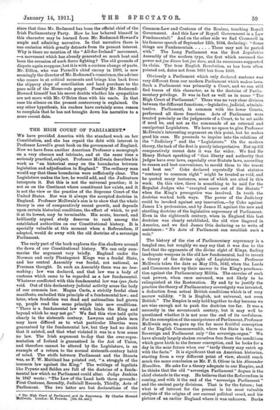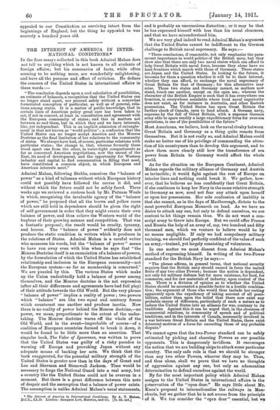THE HIGH COURT OF PARLIAMENT.*
WE have provided America with the standard work on her Constitution, and she has repaid the debt with interest in Professor Lowell's great book on the government of England. Now we have from another American Professor a monograph on a very obscure and intricate, and at the same time a seriously practical, subject. Professor McIlwain describes his work as "an historical essay on the boundaries between legislation and adjudication in England." The ordinary man would say that these boundaries were sufficiently clear. The Legislature makes the law, he would add, and the Judicature interprets it. But this is not the universal practice; it is not so on the Continent where constituent law exists, and it is not the view or the practice of the Supreme Court of the United States. Nor was it always the accepted doctrine in England. Professor Mcllwain's aim is to show that the whole theory is one of comparatively recent growth, and depends upon certain historical conditions, the effect of which, to put it at its lowest, may be terminable. His acute, learned, and brilliantly argued study deserves to rank among the established authorities on our Constitutional history. It is specially valuable at this moment when a Referendum, if adopted, would do away with the old doctrine of a sovereign Parliament.
The early part of the book explores the dim shadows around the dawn of our Constitutional history. We can only sum- mnarise the argument very briefly. England under the Norman and early Plantagoiret Kings was a feudal State, and her central Assembly was feudal, not national, as Freeman thought. In such an Assembly there was no law- making ; law was declared, and that law was a body of customs which came to be regarded as a law fundamental. Whatever conflicted with this fundamental law was ipso facto void. Out of this declaratory judicial activity arose the body Of our common law. Magna Carta, a strictly feudal class manifesto, embodied this principle of a fundamental law; and later, when feudalism was dead and nationalism had grown up, people read the same principle into new conditions. " There is a fundamental law which binds the King and beyond which he may not go." We find this view held quite clearly in the sixteenth century. Lawyers and plain men may have differed as to what particular liberties were guaranteed by the fundamental law, but they had no doubt that it existed, and that what violated it was in a true sense no law. The Irish argument to-day that the over-repre- sentation of Ireland is guaranteed in the Act of Union, and therefore cannot be altered by the Legislature, is an example of a return to the normal sixteenth-century habit of mind. The strife between Parliament and the Stuarts was, as F. W. Maitland has pointed out, " a struggle of the Common law against the King." The writings of legalists like Prynne and Belden are full of the doctrine of a funds- inental law which no Parliament could alter. Judge Jenkins in 1647 wrote : "The Law of the Land hath three grounds : First Custome, Secondly, Judiciall Records, Thirdly, Acts of Parliament. The two latter are but declarations of the * The High Court of Parliament and its Supremacy. By Charles Howard
McIlwain. London: Frowde. [10s. 6d. net.]
Common-Law and Custome of the Realme, touching Royall Government. And this Law of Royall Government is a Law Fundamentall." And on the other side we find Cromwell in his famous speech of September 12th, 1644, declaring: " Some
things are Fundamentals These may not be parted with." The Long Parliament was the first Legislative Assembly of the modern type, the first which assumed the power not jus dicere but jus dare, and its successors supported its claim. The true English Revolution, as has been often pointed out, dates not from 1683 but from 1660.
Obviously a Parliament which only declared customs was very different from our modern Parliament which makes laws. Such a Parliament was primarily a Court, and we can still find traces of this character, as in the doctrine of Parlia- mentary privilege. It was in fact as well as in name "The High Court of Parliament." There was no very clear division between the different functions,—legislative, judicial, adminis- trative. Parliament, in common with the lower Courts, performed all three functions. Acts of Parliament were treated precisely as the judgments of a Court, to be set aside if need be, and not as the commands of an external and omnipotent Legislature. We have no space to give Professor McIlwain's interesting argument on this point, but he makes good his case. He proceeds to inquire into the relations of the " Judiciary " and the "Legislature." On the modern theory, the task of the first is purely interpretative. But up till comparatively recent date it was far wider. We find Sir Henry Hobart speaking of "that liberty and authority that judges have over laws, especially over Statute laws, according to reason and best convenience, to mould them to the truest and best use." Coke declared repeatedly that statutes "contrary to common right" might be treated as void, and he quoted many instances, some of which are cited in this work. On this view, there is something to be said for the Royalist Judges who " excepted cases out of the Statute " when the King's prerogative was involved. In truth the doctrine worked both ways. The power of the Judiciary could be invoked against any innovation,—by Coke against James I.'s pretensions, and by James II. against the new and startling doctrine of the legislative supremacy of Parliament. Even in the eighteenth century, when in England this last doctrine was clearly established, the old view lingered in America, and we find James Otis declaring as to writs of assistance : " No Acts of Parliament can establish such a writ."
The history of the rise of Parliamentary supremacy is a tangled one, but roughly we may say that it was due to the fact that the opponents of the divine right of Kings, finding inadequate weapons in the old law fundamental, had to invent a theory of the divine right of Legislatures. Professor McIlwain takes the date as May 27th, 1642, when the Lords and Commons drew up their answer to the King's proclama- tion against the Parliamentary Militia. The exercise of such vast powers, when once assumed, was not likely to be relinquished at the Restoration. By and by to justify the practice the theory of Parliamentary sovereignty was invented, a deduction from actual British conditions which is of very narrow validity. " It is English, not universal, not even British." The Empire is only held together to-day because we are wise enough not to push the doctrine too far. It was a necessity in the seventeenth century, but it may well be questioned whether it is not near the end of its usefulness. For the conception of the omnipotence of Parliament, Professor McIlwain says, we gave up the far more fruitful conception of the English Commonwealth, where the State is the true Sovereign and Parliament only " the sovereign-organ." We have already largely shaken ourselves free from the conditions which gave birth to the former conception, and he looks for a day in the near future when our "tardy theory may catch up with the facts." It is significant that an American historian, starting from a very different point of view, should reach much the same conclusion as Mr. F. S. Oliver in his Alexander Hamilton. He asks for a theory adequate to our Empire, and he thinks that the old " sovereign Parliament" dogma is the chief obstacle in the way. He believes that the Referendum is coming, and with it the end of the "sovereign Parliament " and the ancient party divisions. That is for the future ; but what is of interest for the present is his most valuable analysis of the origins of our current political creed, and his picture of an earlier England where it was unknown. Burke
appealed to our Constitution as surviving intact from the beginnings of England, but the thing he appealed to was scarcely a hundred years old.







































 Previous page
Previous page